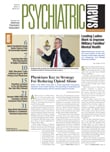Industry Briefs
• On March 24, Targacept Inc. announced in a press release top-line results from a phase 2 proof-of-concept trial of TC-5619 as a treatment for adults with attention-deficit/hyperactivity disorder (ADHD). In the trial, conducted in nonsmokers, TC-5619 did not meet the primary efficacy outcome measure, a change from baseline on the Conners' Adult ADHD Rating Scale-Investigator Rated Total ADHD Symptoms (CAARS-INV) score after four, eight, and 12 weeks of dosing. TC-5619 is a highly selective alpha7 neuronal nicotinic receptor modulator, subject to license by Targacept's strategic collaborator AstraZeneca.
Analysis of the full dataset from the ADHD trial is ongoing, and Targacept plans to present more detailed results at a scientific meeting. In addition to its complete phase 2 trials in ADHD, Targacept is conducting clinical and nonclinical studies designed to support potential phase 2 development of TC-5619 for Alzheimer's disease.
• On March 30, Dainippon Sumitomo Pharma Ltd. (DSP) and Takeda Pharmaceutical Company Ltd., both of Osaka, Japan, announced that they have entered into a licensing agreement for the joint development and exclusive marketing of the oral formulation of lurasidone for treatment of schizophrenia and bipolar disorder in 26 member countries of the European Union, excluding the United Kingdom. Lurasidone, an atypical antipsychotic agent originally developed by DSP, was approved by the FDA for treatment of schizophrenia in adult patients in the United States in October 2010 and is marketed as Latuda.
• On March 28, Greenstone announced a voluntary recall of medicines with lot number FI050058-A on the label. Bottles labeled as citalopram contain finasteride (used to treat benign prostatic hyperplasia). Women who are or who may become pregnant should not take or handle finasteride due to the risk of abnormalities to the external genitalia of a developing male fetus.
Patients who discontinue citalopram abruptly by inadvertently taking the mislabeled product may experience discontinuation symptoms and/or worsening of depression. The recall includes citalopram 10 mg tablets (100-count bottle) and finasteride 5 mg tablets (90-count bottle), both distributed in the U.S. market. The recall is due to the possibility that incorrect labels have been placed on the bottles by a third-party manufacturer.
• On March 22, Japan-based Takeda Pharmaceutical Company announced the launch of Reminyl (galantamine hydrobromide) for the treatment of patients in Japan with dementia of the Alzheimer's type. Reminyl was developed jointly by Johnson and Johnson Pharmaceutical Research and Development and Shire PLC, under a licensing agreement between Janssen Pharmaceutica and Synaptec Inc.
Since its approval for clinical use in Sweden in 2000, it has been used clinically in more than 70 countries and regions around the world to treat patients with mild to moderate dementia of the Alzheimer's type. Galantamine controls the progress of various symptoms of progressive Alzheimer's-type dementia. It enhances the functions of nicotinic acetylcholine receptors in addition to inhibiting acetylcholinesterase. The dual mechanism of action increases the concentration of acetylcholine in the brain, accelerates the release of the neurotransmitter, increases receptor sensitivity, and protects nerve cells.
• At the American Academy of Neurology annual meeting last month in Honolulu, Quanterix Corporation announced in a company release the finding of elevated amyloid beta 42 (Abeta42) in the blood of 26 patients recovering from cardiac arrest at Uppsala University Hospital, Uppsala, Sweden. Abeta42 is a 42 amino acid peptide that is better known as a component of the plaques that are a hallmark of Alzheimer's disease (AD).
All 26 patients exhibited a significant elevation of their blood level of Abeta42 ranging from approximately 50 percent to more than 30-fold. The discovery indicates the possibility of a direct link between brain injury caused by hypoxia and increased serum Abeta42 levels. The finding is the result of the availability of Single Molecule Array (SiMoA) assay, a proprietary technology used by Quanterix to measure clinically important proteins in blood.
"A theory of what causes the elevation and buildup of these plaques in patients with AD is that hypoxic conditions (lack of proper levels of oxygen) trigger the release of Abeta42, which accumulates over time," explained David Wilson, Ph.D., senior director of product development at Quanterix. "If this is the case, then cardiac arrest patients, whose brains have been exposed to acute oxygen deprivation, might show signs of elevated Abeta42 in their blood. We were surprised to see clear elevations of Abeta42 in the blood of every patient we tested."
The results suggest the prognostic value of Abeta42 determination: "We believe the Abeta42 elevations reflect the extent of oxygen deprivation to the brain during the cardiac arrest, and thus correlate with cognitive impairment from the oxygen deprivation," said Wilson.
